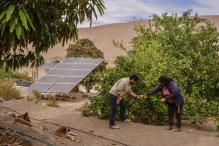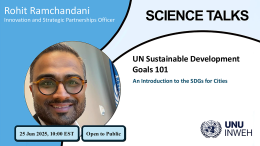The opening session of the Asia-Pacific Mayors’ Academy 2020-2021 was held on 24 November 2020, with the participation of sixteen mayors from nine countries in Asia and the Pacific. The Academy is a joint initiative organised by the UNU Institute for the Advanced Study of Sustainability (UNU-IAS), the UN Economic and Social Commission for Asia and the Pacific (UNESCAP), UN-Habitat, United Cities and Local Government Asia Pacific (UCLG-ASPAC), The Association of Pacific Rim Universities (APRU), and Institute for Global Environmental Strategies (IGES). The opening session and the first module focused on Cities 2030 – Leadership in planning, managing, and financing sustainable urban development.
In her opening remarks, Armida Salsiah Alisjahbana (Executive Secretary, UNESCAP) recognised cities’ critical role in realising the 2030 Agenda and the Paris Agreement. She encouraged Mayors to focus on key priorities and become champions in their communities and across the region in implementing innovative sustainable urban policies. Shinobu Yume Yamaguchi (Director, UNU-IAS) underlined the need for local innovations, mobilisation of resources, and capacity development to implement global frameworks effectively. Maimunah Mohd. Sharif (Executive Director, UN-Habitat) highlighted the importance of shared learning and local leaderships while applauding their COVID-19 responses. Bernadia Tjandradewi (Secretary-General, UCLG-ASPAC) appreciated the commitment of Mayors as enablers for sustainable development for cities and the region by responding to cross-sectoral and multifaceted challenges. Yasuo Takahashi (Executive Director, IGES) reiterated cities’ critical role for development and shared Japanese aspiration to achieve zero carbon by 2050. Rounding up the welcoming remarks from partner institutions, Christina Schönleber (Director of Policy and Programmes, APRU) motivated Mayors to have interactive and engaging learning and continue building a network of mayors in the region.
Following the introduction of the Academy by Stefanos Fotiou (Director, Environment and Development Division, UNESCAP), who explained its pedagogy strategies and how the modules are developed based on the Report of Future of Asian Cities, Kaveh Zahedi (Deputy Executive Secretary, UNESCAP) moderated discussion with the 2019 fellows. Mayor Noraini Roslan of Subang Jaya, Malaysia, and Mayor Maria Gina M. Lizares of Sipalay, Philippines, shared their experiences in tackling COVID-19 in their cities. They encouraged participating Mayors to take advantage of participating in the Academy to help implement their sustainable development initiatives.
The session was followed by a lecture on Global Development Agendas and Localisation by Curt Garrigan (Chief, Urban Development Section, UNESCAP) and a case study presentation on Voluntary Local Review in Shimokawa, Japan, by Hitomi Shimizu (Shimokawa). Then, Mayors were engaged in breakout sessions to discuss the SDGs and enable Mayors to link urban issues with the SDGs. Shinobu Yume Yamaguchi (Director, UNU-IAS) facilitated one of the breakout sessions where Mayors discussed possible executive actions for an urban water scenario and concretely applied the SDGs in the local context in detail.
The opening session was concluded with an introduction of the second session on COVID-19 Response and Recovery: Roles and Actions of Local Government, to be held on 8 and 15 December 2020. To learn more about the Asia-Pacific Mayors’ Academy, visit the Academy's website.
News
Asia-Pacific Mayors’ Academy Highlights Sustainable Urban Development During Opening Session
The opening session of the Asia-Pacific Mayors’ Academy 2020-2021 was held on 24 November 2020.
Related content
Side Event
Rethinking Debt Sustainability to Kickstart Growth
SEVILLE: UNU-WIDER will co-organize a side event at FFD4 examining insights from debt sustainability analyses to tackle debt burden and economic development challenges.
Media Coverage
Opinion: At the UN, we need to do better with less. Here’s how
In Devex, Nicole Goldin and David Passarelli argue that the UN80 reforms can deliver more impact through purpose, pace, priority and precision.



